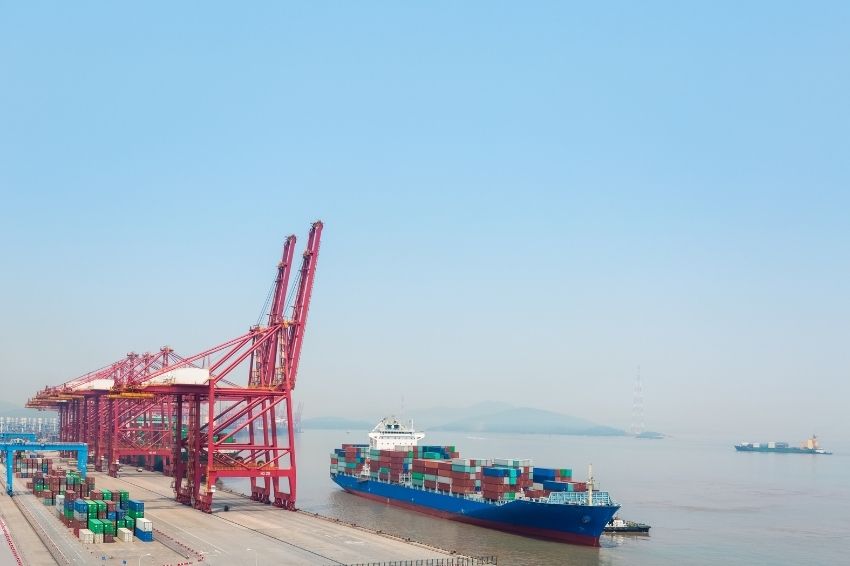The stricter social restrictions imposed by China to contain the newest Covid-19 outbreak, which is in its fourth week and involves more than a dozen cities, hit the transport sector hard, with yet another increase in the price of sea freight.
According to company information Port Trade, the value will be around $ 500 more expensive in Brazil from this Sunday (15). “The increase will be for the unloading of containers. Depending on the shipping company and the type of equipment, this value could exceed US$ 11 thousand”, he explained. Cleber Baldotto, operational manager of the company.
In the last week alone, more than 600 new infections of the disease were registered by the Chinese government, an increase of more than 85% compared to the total number of cases registered in the previous week. In China, the Delta variant has already been detected in more than a dozen Chinese cities since the first cases were found in Nanjing at the end of July.
The outbreak led authorities to reinforce containment measures to combat the spread of the virus, which affected the routine of professionals working in the country's main ports. This week, for example, China closed one of the terminals at the port of Ningbo-Zhoushan and placed around two thousand workers in quarantine after detecting just one case of Covid-19 among employees.
The space is the third largest seaport in the world and 25% of its movement takes place in the terminal that was closed for an indefinite period. The strike worried the financial market and affected currency negotiations. “Some problems are happening in other locations. In Shenzhen, for example, there are restrictions due to health surveillance”, highlighted Baldotto.
Photovoltaic equipment distributors
The events are already being followed and monitored by several distributors. Roberto Marcel Caurim, CEO of Bluesun, explains that the company currently maintains an office in Shenzhen to facilitate the import of solar equipment into China. “What we are doing is monitoring the ports. If one of them is closed or has problems, we send the equipment to another location by land transport so as not to miss the delivery deadline”, he explains.
In turn, Fábio Delgado, director of Techlux, assesses that the sea freight price crisis is directly related to the Covid-19 outbreak and also to other issues, such as North American self-consumption of Chinese products. He further explains that when one port is affected, most of the others end up being affected as well.
“Most ports are interconnected and when one is hit, the others end up being hit too. At the beginning of the week we had the beginning of a coronavirus outbreak in Ningbo and the Chinese authorities are very drastic. There were few cases, but they closed the port for a few days. This only contributed to more equipment shortages and an increase in prices, including solar panels in Brazil”, he highlighted.
Another point remembered by the executive and which also explains the increase in the price of solar panels is the current value of polysilicon, a raw material for the production of photovoltaic cells.
“Manufacturers announced this week a new increase in almost all cells. Those who placed the order until today (Friday) were able to buy it at the same price, but those who didn't buy it will receive an increase of 6%”, he said.
Luiz Scagnolato, CEO of TenBrasil, commented that the solar sector has faced major challenges recently with price increases amid the Covid-19 pandemic. “As if the restrictions caused by the disease were not enough, it also affects all world trade, whether in the product that will be shipped, what was at the port or in the production that now takes time to receive raw materials”, he stated.
Already Beatriz Meneguim, responsible for importing products from BelEnergy, commented that the company adopted a strategy to plan and schedule all shipments in advance, controlling cargo readiness forecasts so that “we can minimize these impacts on our stock of imported materials as much as possible”, he said.
World problem
It is not only in Brazil that the increase in the price of sea freight has generated concern. In Europe and the United States, the value has also “exploded” in recent months. “We have already received information that freight rates are varying between US$ 20 thousand and US$ 23 thousand (…) The increase is much greater in these countries than in Brazil”, revealed Baldotto.
Read too: 2nd semester will be more challenging for importing photovoltaic equipment
Since the beginning of the year, the price of polysilicon and sea freight has been rising around the world. Historically, silicon has never been priced so high and it tends to become even more expensive in the coming months. Sea freight rose more than 30% in the first half of the year, jumping from US$ 6 thousand to US$ 10 thousand, between the months of January and June, according to Port Trade.


















